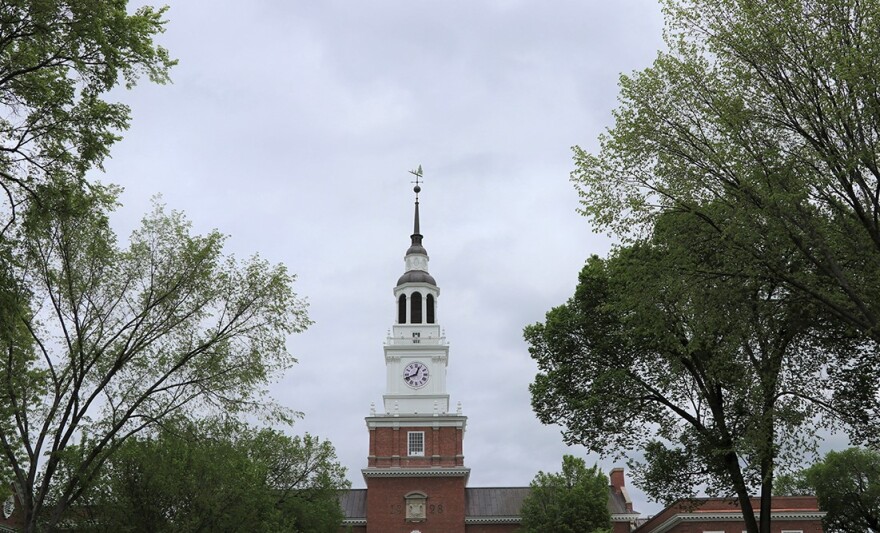Health
Dartmouth Researchers Alarmed by Trump’s Biomedical Cuts

Research institutions are grappling with significant funding cuts following changes implemented by the Trump administration, particularly affecting biomedical research. At Dartmouth College, the impact is particularly pronounced, as researchers like Dr. Steven Bernstein find their projects in jeopardy.
Dr. Bernstein, a researcher at Dartmouth Hitchcock Medical Center, had planned a study focusing on the health of farm workers in the dairy industry in northern New Hampshire and Vermont. The initiative, which aimed to enhance the social determinants of health for these workers, was expected to cost approximately $3 million over five years. Unfortunately, the National Institutes of Health (NIH) recently eliminated funding opportunities for such projects, citing their association with diversity, equity, and inclusion (DEI) initiatives.
In an interview, Bernstein expressed his dismay at the NIH’s decision, stating, “There’s been tremendous anxiety and unease and fear among all of us.” He noted that many researchers, particularly those at the beginning of their careers, rely heavily on initial grants for their professional development.
The NIH, as the world’s largest funder of biomedical research, has faced scrutiny for its recent funding cuts. Since January 2023, the agency has rejected thousands of grant applications, particularly those related to DEI topics. Bernstein highlighted that the number of grants affected at Dartmouth Hitchcock has been “modest,” yet the broader implications of the NIH’s policies are alarming.
While the University of New Hampshire also receives NIH funding, it has reportedly been less impacted by the cuts, according to Tania DeLuzuriaga, the university’s Director of Public Relations. Nonetheless, the overall trend has caused considerable distress within the research community.
The funding cuts have been categorized into four distinct groups. The first group includes grants that have already been awarded but subsequently terminated by the federal government. Bernstein cited that at least three federal grants at Dartmouth College have been canceled, including research on circadian rhythms and treatment for opioid addiction.
The second category consists of grants that have not yet been terminated but have not received confirmation of funding for the upcoming year. This uncertainty has forced Dartmouth Hitchcock to front the costs, creating financial constraints and anxiety among researchers. Bernstein described this situation as one where investigators find themselves “in a bit of a limbo.”
A third category encompasses grants that were not submitted due to the elimination of funding opportunities, including Bernstein’s research on farm workers. The final category reflects the potential loss of talented researchers reconsidering their career paths in light of these funding challenges. Bernstein remarked on the significant concerns regarding the future of scientific talent in the field, stating, “The potential loss of regeneration of scientific talent is real.”
Despite the challenges, Bernstein noted that Dartmouth Hitchcock has been receiving applications from highly qualified researchers leaving institutions that have faced stricter funding cuts. “In a way, it’s an opportune moment for Dartmouth and Dartmouth Hitchcock to recruit scientific talent,” he explained.
As the NIH navigates these funding changes, the scientific community is left to ponder the long-term repercussions on research and public health. Bernstein emphasized the importance of maintaining support for biomedical research, which has historically enjoyed bipartisan backing.
The White House has not responded to inquiries regarding these funding cuts. Dartmouth’s president, Sian Leah Beilock, has maintained a neutral stance amidst these challenges, distinguishing the institution from other Ivy League schools that have condemned federal cuts.
Research at Dartmouth and its affiliated institutions continues, but the shadows of uncertainty loom large as scientists strive to pursue their work in the face of unprecedented challenges. The ongoing situation raises critical questions about the future of biomedical research in the United States and its global standing.
-

 Lifestyle3 months ago
Lifestyle3 months agoLibraries Challenge Rising E-Book Costs Amid Growing Demand
-

 Sports3 months ago
Sports3 months agoTyreek Hill Responds to Tua Tagovailoa’s Comments on Team Dynamics
-

 Sports3 months ago
Sports3 months agoLiverpool Secures Agreement to Sign Young Striker Will Wright
-

 Lifestyle3 months ago
Lifestyle3 months agoSave Your Split Tomatoes: Expert Tips for Gardeners
-

 Lifestyle3 months ago
Lifestyle3 months agoPrincess Beatrice’s Daughter Athena Joins Siblings at London Parade
-

 World3 months ago
World3 months agoWinter Storms Lash New South Wales with Snow, Flood Risks
-

 Science3 months ago
Science3 months agoTrump Administration Moves to Repeal Key Climate Regulation
-

 Business3 months ago
Business3 months agoSoFi Technologies Shares Slip 2% Following Insider Stock Sale
-

 Science3 months ago
Science3 months agoNew Tool Reveals Link Between Horse Coat Condition and Parasites
-

 Science2 months ago
Science2 months agoSan Francisco Hosts Unique Contest to Identify “Performative Males”
-

 Sports3 months ago
Sports3 months agoElon Musk Sculpture Travels From Utah to Yosemite National Park
-

 Science3 months ago
Science3 months agoNew Study Confirms Humans Transported Stonehenge Bluestones








